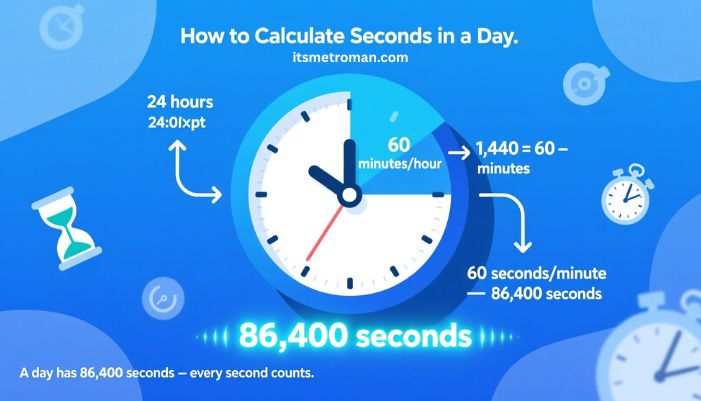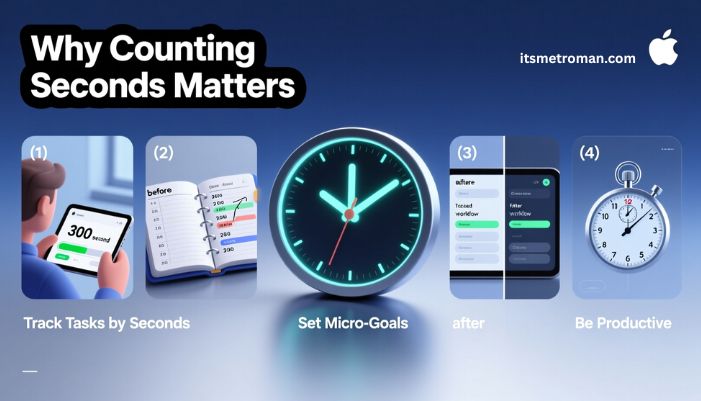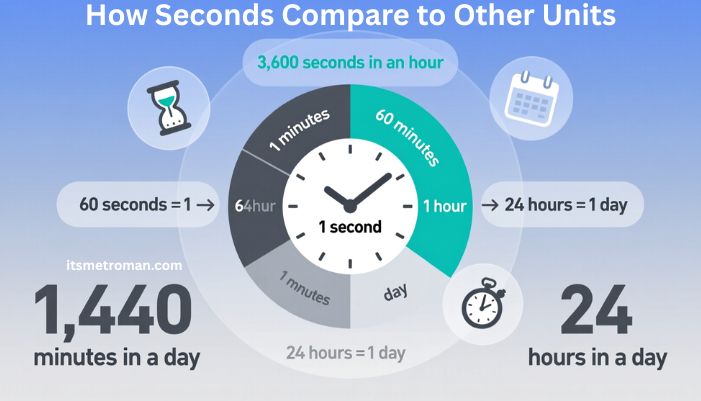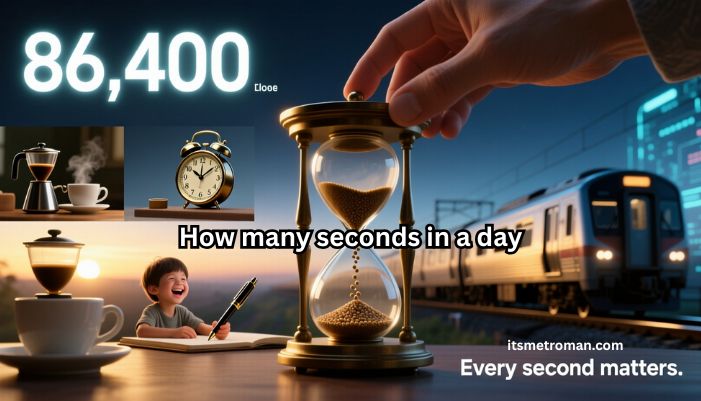Do you want to know exactly how many seconds are in a day? Most people think about time in hours or minutes. But looking at seconds can help you see your day in a new way.
Knowing the number of seconds can help you manage time, plan your day, or just satisfy your curiosity.
How to Calculate Seconds in a Day

Calculating seconds in a day is simple.
- A day has 24 hours.
- Each hour has 60 minutes.
- Each minute has 60 seconds.
Now multiply them step by step:
24 hours × 60 minutes = 1,440 minutes in a day
1,440 minutes × 60 seconds = 86,400 seconds in a day
So, a normal day has 86,400 seconds.
This number is useful. You can plan your day in smaller chunks. It shows how much time you have for everything you do.
Seeing Seconds in Real Life
Even if you know a day has 86,400 seconds, it can feel abstract. Let’s make it clear.
- 1 hour = 3,600 seconds
- 1 minute = 60 seconds
If you sleep 8 hours, you spend 28,800 seconds resting. That leaves 57,600 seconds for work, meals, and fun.
If you work 9 hours, you spend 32,400 seconds working. Seeing time in seconds helps you value it more.
Why Counting Seconds Matters

Counting seconds is not just fun. It can help you in real life.
- Manage your time: Track tasks by seconds to see exactly how long they take.
- Set goals: You can make small goals for short periods, like 300-second tasks.
- Be productive: You notice how long each task takes.
Seconds give you a clear view of your day. You can see how quickly time passes and use it wisely.
Fun Facts About Seconds
Time has interesting facts you might not know:
- The word “second” comes from “secunda,” which means “the second division of an hour.”
- Some days have a leap second added to match Earth’s rotation.
- A non-leap year has 31,536,000 seconds.
These facts show that time is precise but also flexible.
How Seconds Compare to Other Units

Knowing how seconds relate to hours and minutes helps you plan better.
- Minutes in a day: 1,440
- Hours in a day: 24
- Seconds in an hour: 3,600
You can use this to schedule tasks, calculate deadlines, or set timers for short activities.
Using Seconds in Your Daily Life
Here are ways you can use seconds:
- Exercise: Track workouts in seconds to stay consistent.
- Work tasks: Break big tasks into small time blocks.
- Cooking: Use seconds to cook precisely, like boiling or baking.
Every second counts. Tracking them helps you see patterns and use your time better.
Why Time Feels Fast or Slow
Even though a day has 86,400 seconds, time can feel different.
- Busy days: Seconds seem to fly when you focus on tasks.
- Waiting: Seconds feel longer when you do nothing.
Counting seconds shows the real and felt time. You can organize your day better when you know this.
Days With Extra or Fewer Seconds
Some days do not have exactly 86,400 seconds.
- Leap seconds: Added to keep time aligned with Earth’s rotation.
- Daylight saving: Clock changes make some days slightly shorter or longer.
Even with these changes, most days stick to 86,400 seconds.
Quick Reference Table
| Unit | Amount in a Day |
|---|---|
| Seconds | 86,400 |
| Minutes | 1,440 |
| Hours | 24 |
| Sleep (8 hours) | 28,800 seconds |
| Work (9 hours) | 32,400 seconds |
This table shows how seconds are used in everyday life.
Extra Tips to Use Seconds Wisely
- Set timers for short tasks.
- Track how long you spend on activities.
- Break work into small blocks to stay focused.
Knowing how many seconds you have makes your day more manageable. You will see how each moment matters.
Frequently Asked Questions
Q1: Are there always 86,400 seconds in a day?
A standard day has 86,400 seconds. Leap seconds make some days slightly longer.
Q2: How many seconds are in an hour?
Each hour has 3,600 seconds.
Q3: How many seconds do I sleep each night?
Sleeping 8 hours equals 28,800 seconds.
Q4: Can a day have fewer seconds?
Yes, during daylight saving changes, a day can have slightly fewer seconds.
Q5: How can I use seconds to track time better?
Track tasks in seconds. Break work into short blocks. Set precise timers.
Final Thoughts
You have 86,400 seconds in a day. Every second matters. Tracking seconds helps you plan, manage, and value your time. Think of your day in seconds. You will notice how fast it passes and how to spend it wisely.

